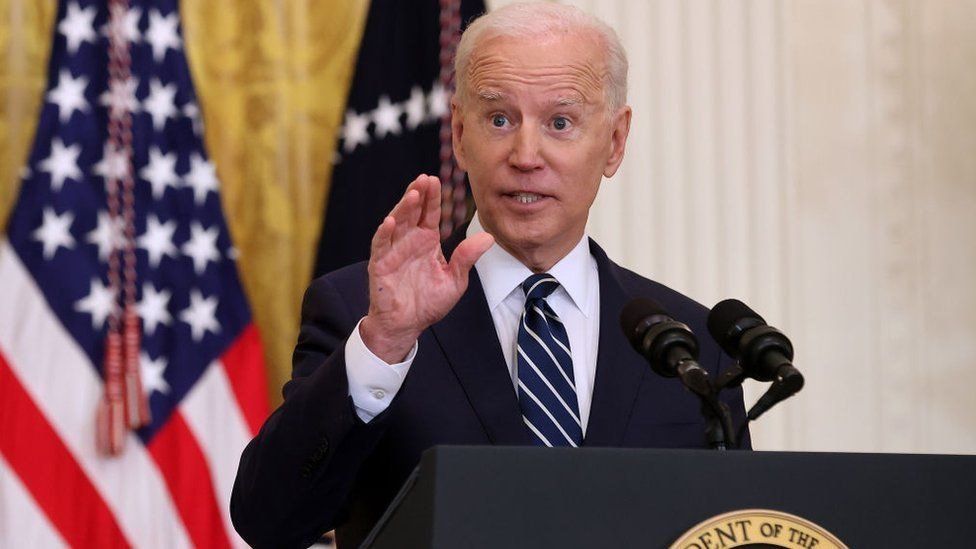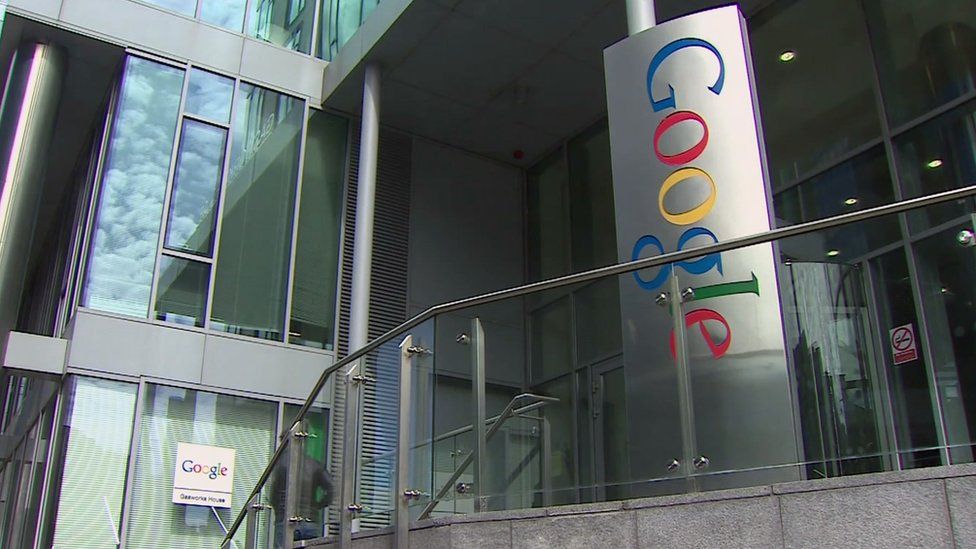Investment
Joe Biden tax plan affect US investment in Ireland?

|
|
Getty Images
Wander around Dublin’s Grand Canal Quay and you get a sense of how successful the Republic of Ireland has been in attracting US technology companies.
Google has its international headquarters across a campus of offices and will soon have more space nearby at the Boland’s Mill development.
Just across the canal, Facebook has its international HQ with Tripadvisor and AirBnB close by.
Last month its Irish founders said they’re planning about 1,000 new jobs in Ireland.
The head of the country’s inward investment agency, Martin Shanahan, described the Stripe investment as a “phenomenal signal from Ireland and about Ireland”.
But there’s now a risk that the pipeline of investment from the US could dry up if President Joe Biden can lead a major change to global tax rules.
Irish tax advantage under threat
In among those tech company HQs in Dublin’s docklands, you will also find the offices of the lawyers and accountants who help US firms use Ireland’s tax system to reduce their global tax bills.
For the last 20 years Ireland has had a simple message: invest here and you will pay just 12.5% tax on your Irish profits.
That compares favourably to headline corporation tax rates of 19% in the UK, 30% in Germany and 26.5% in Canada.
It is an article of faith in Irish politics that the 12.5% rate has been vital to attracting US investment.
But that tax advantage could be seriously undermined if President Biden gets his way.


The most striking of his proposals – and the one of most consequence for Ireland – is for a global minimum corporate tax rate.
The US Treasury Secretary Janet Yellen has suggested a 21% minimum rate.
“We are working with G20 nations to agree to a global minimum corporate tax rate that can stop the race to the bottom,” she said in a speech last week.
“Together we can use a global minimum tax to make sure the global economy thrives based on a more level playing field in the taxation of multinational corporations.”
What would it mean for Ireland’s economy?
Essentially that would mean if a company paid tax at the lower Irish rate, then the US (or other countries) could top up that company’s tax in their jurisdiction to get it to the global minimum.
So if a US company had a presence in Ireland primarily for the tax advantage, that advantage would disappear.
This is a matter of urgency for the Biden administration because it is planning to raise corporate taxes at home and would prefer not to see more tax revenues leaking to other countries.
Peter Vale, tax partner with accounting firm Grant Thornton in Dublin, thinks a global minimum rate is now an inevitability.
“If you’d asked me six months ago I’d have been quite sceptical, there was a lot of opposition,” he said.
“But it’s now moving by the day and, with the US behind it with its plans, I think we’re going to arrive at some sort of global consensus.”
He said the key issue for Ireland becomes the level at which the rate is set.
“I don’t think 21% is where it will land, I suspect it will be somewhere in the teens.”


Niall Carson/PA
Other details will be important too: “Exactly how will you work out what the rate is a company is paying in Ireland and what does that mean in terms of any top up? The detail becomes pretty critical.”
The Biden proposals have reinvigorated work which is being led by the OECD (Organisation for Economic Co-operation and Development), an intergovernmental economic organisation.
It began a project known as Base Erosion and Profit Shifting (BEPS) in 2013, which aims to mitigate tax loopholes which currently allow companies to shift profits from higher tax countries to lower tax countries like Ireland.
‘Intention to target Ireland’
Perhaps ironically Ireland appears to have been a major beneficiary of some of the early outcomes of the BEPS project.
The country’s corporation tax receipts have soared from about €4bn (£3.5bn) in 2013 to around €12bn (£10.5bn) in 2020.
Seamus Coffey, an expert in Irish corporation tax, told the At the Margin podcast that this was because of the focus on what is known as “substance”.
That is the principle that companies should declare their profits in the location where they have real operations or activities.
“Countries like Ireland have been a huge winner from BEPS mark one,” he said.
“The objective was to align profit with substance and we actually are one of the countries where these companies have substance, whether it be pharmaceuticals, computer chips, medical devices and the ICT companies.
“I think when countries in the G7 looked at this they thought ‘that’s not quite what we wanted’ – maybe the intention was to target countries like Ireland, not benefit them.”
When could we see an impact?
In the next round of BEPS, with the US on board, those other rich countries are more likely to get what they want at Ireland’s expense.
But even if President Biden can agree the reforms at home and abroad, how quickly would that have an impact in Ireland?
Mr Coffey thinks any negative effects would not be instant because tax is not everything.
“Are the ICT companies likely to head off around the world, scattering their headquarters to various different cities?” he said.
“There are benefits to being co-located. At least in the medium term we are not likely to see a huge shock.”
That is echoed by the IDA (Industrial Development Authority), the inward investment agency, which points to Ireland’s workforce and significant clusters of specialisation in areas like medical technology and pharmaceuticals.
The IDA also sees the Brexit angle, pointing out that Ireland, unlike its UK neighbour, is part of the EU’s single market.
In a statement, it said: “Ireland is at the heart of Europe. Ireland’s continued commitment to the EU is a core part of Ireland’s value proposition to foreign investors, offering a base to access the European Single Market and to grow their business.
“Ireland also benefits from free movement of people within the EU, giving businesses located in Ireland access to a European labour market.”
The Irish government has been engaged in the BEPS process, though in a speech last year the Finance Minister, Pascal Donohoe, said he remained to be convinced of the need for minimum taxation, beyond the specific challenges relating to the digital economy.
This week a government spokesman said: “Ireland is aware of the US proposals.
“We are constructively engaging in these discussions, and will consider any proposals carefully noting that political level discussions on these issues have not yet taken place with the 139 countries involved in this process.”
Source: – BBC News
Investment
Deutsche Bank's Investment Bankers Step Up as Rate Boost Fades – Yahoo Canada Finance
(Bloomberg) — Deutsche Bank AG relied on its traders and investment bankers to make up for a slowdown in income from lending, as Chief Executive Officer Christian Sewing seeks to deliver on an ambitious revenue goal.
Most Read from Bloomberg
Fixed income trading rose 7% in the first quarter, more than analysts had expected and better than most of the biggest US investment banks. Income from advising on deals and stock and bond sales jumped 54%.
ADVERTISEMENT
Revenue for the group rose about 1% as the prospect of falling interest rates hurt the corporate bank and the private bank that houses the retail business.
Sewing has vowed to improve profitability and lift revenue to €30 billion this year, a goal some analysts view with skepticism as the end of the rapid rate increases weighs on revenue from lending. In the role for six years, the CEO is cutting thousands of jobs in the back office to curb costs while building out the advisory business with last year’s purchase of Numis Corp. to boost fee income.
“We are very pleased” with the investment bank, Chief Financial Officer James von Moltke said in an interview with Bloomberg TV. The trends of the first quarter “have continued into April,” he said, including “a slower macro environment” that’s being offset by “momentum in credit” and emerging markets.
While traders and investment bankers did well, revenue at the corporate bank declined 5% on lower net interest income. Private bank revenue fell about 2%. Both units benefited when central banks raised interest rates over the past two years, allowing them to charge more for loans while still paying relatively little for deposits.
With inflation slowing and interest rates set to fall again, that effect is reversing, though markets have scaled back expectations for how quickly and how deep central banks are likely to cut. That’s lifted shares of Europe’s lenders recently, with Deutsche Bank gaining 25% this year.
“Deutsche Bank reported a reasonable set of results,” analysts Thomas Hallett and Andrew Stimpson at KBW wrote in a note. “The investment bank performed well while the corporate bank and asset management underperformed.”
–With assistance from Macarena Muñoz and Oliver Crook.
(Updates with CFO comments in fifth paragraph.)
Most Read from Bloomberg Businessweek
©2024 Bloomberg L.P.
Investment
How Can I Invest in Eco-friendly Companies? – CB – CanadianBusiness.com


Welcome to CB’s personal-finance advice column, Make It Make Sense, where each month experts answer reader questions on complex investment and personal-finance topics and break them down in terms we can all understand. This month, Damir Alnsour, a lead advisor and portfolio manager at money-management platform Wealthsimple, tackles eco-friendly investments. Have a question about your finances? Send it to [email protected].
Q: It’s Earth Month! And… there’s a climate crisis. How can I invest in companies and portfolios funding causes I believe in?
Earth Day may have been introduced in 1970, but today it’s more relevant than ever: In a 2023 survey, 72 per cent of Canadians said they were worried about climate change. Along with carpooling, ditching single-use plastics and composting, you can celebrate Earth Month this year by greening your investment portfolio.
Green investing, or buying shares in projects, companies, or funds that are committed to environmental sustainability, is an excellent way to support projects and businesses that reflect your passions and lifestyle choices. It’s growing in favour among Canadian investors, but there are some considerations investors should be mindful of. Let’s review some green investing options and what to look out for.
Green Bonds
Green bonds are a fixed-income instrument where the proceeds are put toward climate-related purposes. In 2022, the Canadian government launched its first Green Bond Framework, which saw strong demand from domestic and global investors. This resulted in a record $11 billion green bonds being sold. One warning: Because it’s a smaller market, green bonds tend to be less liquid than many other investments.
It’s also important to note that a “green” designation can mean a lot of different things. And they’re not always all that environmentally-guided. Some companies use broad, vague terms to explain how the funds will be used, and they end up using the money they raised with the bond sale to pay for other corporate needs that aren’t necessarily eco-friendly. There’s also the practice of “greenwashing,” labelling investments as “green” for marketing campaigns without actually doing the hard work required to improve their environmental footprint.
To make things more challenging, funds and asset managers themselves can partake in greenwashing. Many funds that purport to be socially responsible still hold oil and gas stocks, just fewer of them than other funds. Or they own shares of the “least problematic” of the oil and gas companies, thereby touting emission reductions without clearly disclosing the extent of those improvements. As with any type of investing, it’s important to do your research and understand exactly what you’re investing in.
Socially Responsible Investing (SRI) and Impact Investing
SRI and impact investing portfolios hold a mix of stocks and bonds that are intended to put your money towards projects and companies that work to advance progressive social outcomes or address a social issue—i.e., investing in companies that don’t wreak havoc on society. They can include companies promoting sustainable growth, diverse workforces and equitable hiring practices.
The main difference between the two approaches is that SRI uses a measurable criteria to qualify or disqualify companies as socially responsible, while impact investing typically aims to help an enterprise produce some social or environmental benefit.
Related: Climate Change Is Influencing How Young People Invest Their Money
Some financial institutions use the two approaches to build well-diversified, low-cost, socially responsible portfolios that align with most clients’ environmental and societal preferences. That said, not all portfolios are constructed with the same care. As with evaluating green bonds, it’s important to remember that a company or fund having an SRI designation or saying it partakes in impact investing is subjective. There’s always a risk of not knowing exactly where and with whom the money is being invested.
All three of these options are good reminders that, even though you may feel helpless to enact environmental or social change in the face of larger systemic issues, your choices can still support the well-being of society and the planet. So, if you have extra funds this April (maybe from your tax return?), green or social investing are solid options. As long as you do thorough research and understand some of the limitations, you’re sure to find investments that are both good for the world and your finances.
Investment
MOF: Govt to establish high-level facilitation platform to oversee potential, approved strategic investments


|
|
KUALA LUMPUR: A meeting with 70 financial fund investors and corporate members at the recently concluded Joint Investors Meeting in London has touched on the MADANI government’s immediate action to stimulate strategic investment in important technologies, according to the Ministry of Finance (MoF).
In a statement today, it said that the government is serious about making investments a national agenda through the establishment of a high-level investment facilitation platform to ensure the implementation of potential and approved strategic investments through a “Whole of Government” approach.
Minister of Finance II Datuk Seri Amir Hamzah Azizan (pix), who led the Malaysian delegation to the Joint Investors Meeting from April 20 to 22, said that the National Investment Council (MPN) chaired by the Prime Minister is an integrated action that reflects how serious the government is in making Malaysia an investment hub in the region.
Among the immediate actions taken by the government is establishing the National Semiconductor Strategic Committee (NSSTF) to facilitate cooperation between the government, industry players, universities, and relevant stakeholders to place the Malaysian semiconductor industry at the forefront and ensure the continued growth of the electronics & electrical industry, especially the semiconductor sector, as a major contributor to the Malaysian economy.
The government also aims to empower Malaysia as a preferred green investment destination as well as remove barriers and bureaucracy in the provision and accessibility to renewable energy, especially for the new technology industry, including data centres, said Amir Hamzah.
He also said that the country’s investment prospects have reached an extraordinary level, with approved investments surging to RM329.5 billion in 2023 from RM268 billion in 2022.
He said about 74 per cent of manufacturing projects approved between 2021 and 2023 have been completed or are in process.
In addition, Amir Hamzah said the greater initial stage construction work completed in 2023 (RM31.5 billion) and 2022 (RM26.3 billion) shows a positive trend for future investment opportunities.
“From a total of 5,101 investment projects approved in 2023, as many as 81.2 per cent or 4,143 projects are in the services sector, 883 projects in the manufacturing sector, and 75 projects in other related sectors,” he said.
Before this, Amir Hamzah met with international investors in New York and Washington to clarify the direction of the implementation of the MADANI Economic framework to improve investors’ confidence in Malaysia’s economic level and strengthen the perception and investment sentiment of foreign investors towards the country.




-
Art22 hours ago
The unmissable events taking place during London’s Digital Art Week
-
News24 hours ago
What is a halal mortgage? How interest-free home financing works in Canada
-



 Politics17 hours ago
Politics17 hours agoOpinion: Fear the politicization of pensions, no matter the politician
-
Economy23 hours ago
German Business Outlook Hits One-Year High as Economy Heals
-
Media16 hours ago
B.C. puts online harms bill on hold after agreement with social media companies
-



 Politics16 hours ago
Politics16 hours agoPecker’s Trump Trial Testimony Is a Lesson in Power Politics
-
Business16 hours ago
Oil Firms Doubtful Trans Mountain Pipeline Will Start Full Service by May 1st
-



 Science16 hours ago
Science16 hours agoNASA Celebrates As 1977’s Voyager 1 Phones Home At Last



